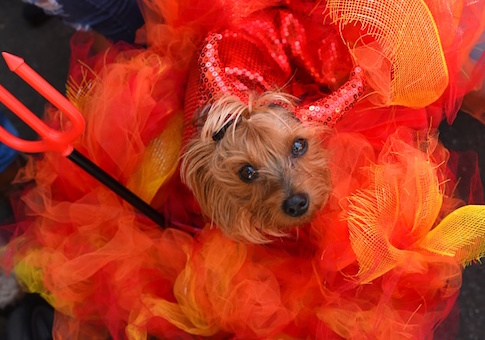North American universities have come out in force to warn their students on avoiding "cultural appropriation" in their Halloween costume choices, and some students have run into trouble in their efforts to push back.
Clare McKinney—the president of the conservative Young American's for Freedom of Notre Dame and its sister school, Saint Mary's College—told the Washington Free Beacon she's been sucked into a standoff with the Student Activities Office, which has not approved YAF's request to set up a protest of the sanitization of Halloween.
McKinney said her group hoped to participate next week in a national counter-initiative by the Young America's Foundation's—the club's parent organization—titled "Funeral for Halloween," which instructs students to fill a mock coffin with Halloween decorations and to hand out fake obituaries announcing the "untimely death" of the holiday killed by "political correctness."
McKinney said, as of Friday, she was unsure if YAF would be permitted to set up on the quad.
Student affairs staff have repeatedly told her they need to "discuss the request" with YAF, as well as with other university departments, before they can approve it.
"We've had about 15 events, and biweekly club meetings, and I've never had problems reserving space for anything else," said McKinney.
McKinney said she has been mocked and smeared on social media by fellow students for her opposition to the school's participation in the annual "culture, not a costume" campaign, where school's apply that cautionary tagline to events, flyers, and social media posts ahead of Halloween.
Erin McManus, a member of the Notre Dame/Saint Mary's College YAF, told the Free Beacon her sociology professor offered students extra credit to attend and write a reflection on the university's event.
McManus said the program, which was co-sponsored by the sociology and justice studies departments and pushed by administrators in a student-wide email, covered the potential transgressions, including white people dressing up in feathered headdresses or as the Polyensian Disney princess Moana.
The program organizers told attendees that they were not targeting freedom of expression, but only wanted to make sure Halloween was fun and inoffensive, said McManus.
"They're just trying to politicize everything these days, which is so annoying," she said.
Other schools using the "culture not costume" line include Central Michigan University, Washington State University, Kent State University, Dickinson College, Northern Arizona University—and many others.
Arcadia University's departments of sociology, anthropology, and criminal justice held a program titled, "Cultural Appropriation: The Scariest Thing About Halloween."
The Gonzaga University Student Body Association had a "courageous conversation" about the issue, while Princeton students were invited to a "conversation circle."
The University of St. Thomas posted pointers on its blog to aid students who might be "second-guessing" their outfits. The article links to an MTV News video that "debunks" myths about cultural appropriation.
Alarm bells should go off, St. Thomas explains, if a student realizes his costume could be described with the words "traditional," "tribal," or "ethnic."
Adam Goldstein, the Jackson Legal Fellow at the Foundation for Individual Rights in Education, a free speech organization, said the policing of Halloween has been going on for at least a dozen years, but that the practice has picked up speed since 2015. That year, Yale University employees were mobbed for suggesting there might be an undue obsession with student costumes.
"Each year, I think I've seen it all, that this is as crazy as they can get, but then the next Halloween rolls around," said Goldstein.
Goldstein dismissed both "cultural appreciation," which is considered acceptable, and "cultural appropriation," which is not, as meaningless.
"There's no legal definition for either term. It's just a shifting line dependent on rhetoric, taste, the particular emotional state of an individual," said Goldstein. "That two administrators at the same institution could disagree on whether something was 'appreciation' or 'appropriation' is solid evidence that [these terms] can never meet the demands of due process."
Though students are instructed not to dress up as people of other ethnicities, but Goldstein noted people commonly have multi-ethnic backgrounds, making such a mandate hard to parse.
"If I'm accused of cultural appropriation, do I bring out my report from 23AndMe (a genetic ancestry service) showing I'm whatever percent Russian or Ethiopian," Goldstein asked.
He said students who get into hot water over their costumes should seek legal aid.
"Public universities are bound by the First Amendment and private universities that have promised freedom of expression to their students have made their own contractual obligation to the students," said Goldstein. "If administrators break those agreements, students should stand up for what they believe."
He said FIRE has helped students on many a free speech legal battle, though never yet on a Halloween lawsuit.
"It's probably a matter of time," said Goldstein.
